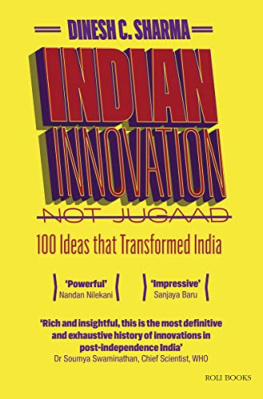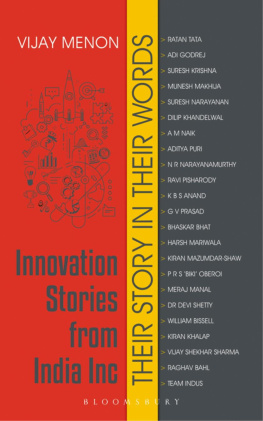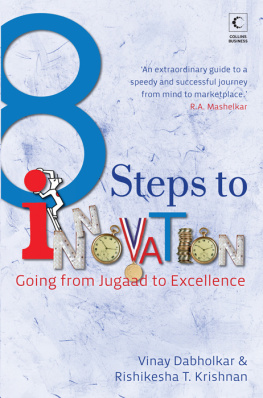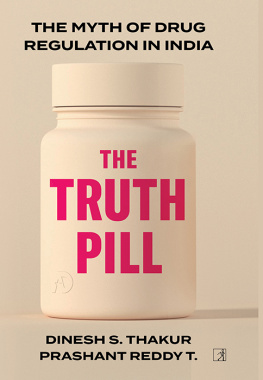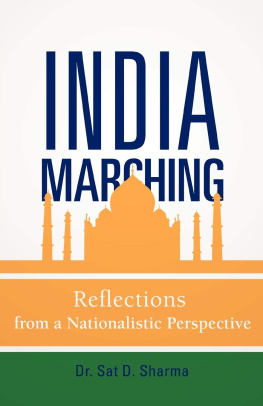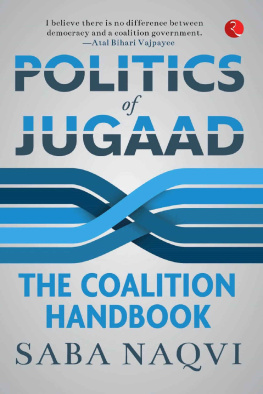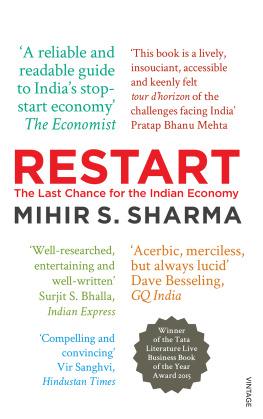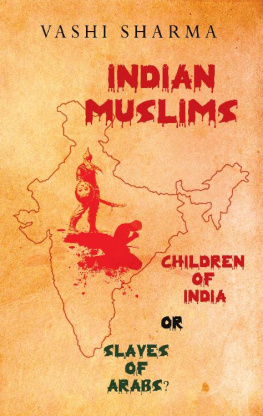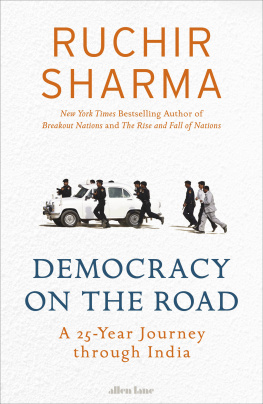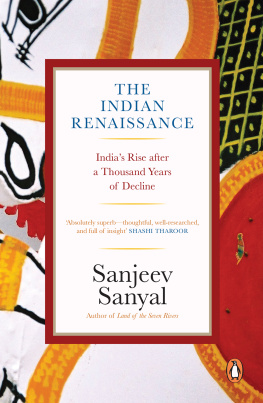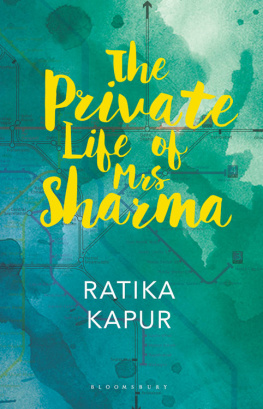Dinesh C. Sharma - Indian Innovation, Not Jugaad - 100 Ideas that Transformed India
Here you can read online Dinesh C. Sharma - Indian Innovation, Not Jugaad - 100 Ideas that Transformed India full text of the book (entire story) in english for free. Download pdf and epub, get meaning, cover and reviews about this ebook. year: 2022, genre: Politics. Description of the work, (preface) as well as reviews are available. Best literature library LitArk.com created for fans of good reading and offers a wide selection of genres:
Romance novel
Science fiction
Adventure
Detective
Science
History
Home and family
Prose
Art
Politics
Computer
Non-fiction
Religion
Business
Children
Humor
Choose a favorite category and find really read worthwhile books. Enjoy immersion in the world of imagination, feel the emotions of the characters or learn something new for yourself, make an fascinating discovery.
- Book:Indian Innovation, Not Jugaad - 100 Ideas that Transformed India
- Author:
- Genre:
- Year:2022
- Rating:3 / 5
- Favourites:Add to favourites
- Your mark:
- 60
- 1
- 2
- 3
- 4
- 5
Indian Innovation, Not Jugaad - 100 Ideas that Transformed India: summary, description and annotation
We offer to read an annotation, description, summary or preface (depends on what the author of the book "Indian Innovation, Not Jugaad - 100 Ideas that Transformed India" wrote himself). If you haven't found the necessary information about the book — write in the comments, we will try to find it.
Indian Innovation, Not Jugaad - 100 Ideas that Transformed India — read online for free the complete book (whole text) full work
Below is the text of the book, divided by pages. System saving the place of the last page read, allows you to conveniently read the book "Indian Innovation, Not Jugaad - 100 Ideas that Transformed India" online for free, without having to search again every time where you left off. Put a bookmark, and you can go to the page where you finished reading at any time.
Font size:
Interval:
Bookmark:
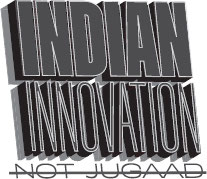
As India turns 75, Indian Innovation unpacks 100 ideas that transformed a young democratic republic into a complex and thriving nation of a billion-plus people. With compelling urgency and the lucidity of a skilled narrator, Dinesh C. Sharma writes of an India newly independent in 1947 after the British colonial powers left it to its own destiny, of its subsequent wavering journey through the decades all the way to a raging pandemic and of the small and big innovations that paved the way for India.
In doing so, he turns on their heads prevailing notions of innovation often propagated in a galaxy of books on the much used and abused narrative of jugaad that romance the idea of how the poor innovate to get by. Very often, a bulk of the writing heavily focuses on technological, novel, IT or digital solutions and disruptions alone, many of which fizzle out as one-time wonders.
Sharma does the difficult job of writing about the original disruptions that revolutionized the way things were done in a particular sector and context. Covering policies, concepts, and institutions in areas such as, but not limited to, science, healthcare, education, governance, business, grassroots movements, agriculture, fashion, law and others, this is a book one needs to read to better understand India.
Propulsively put together with effortless prose, Sharmas writing, with his decades long journalistic understanding of science, technology, environment, and communities, is teeming with stories and anecdotes of innovations that went on to change the lives of Indians forever. From software parks to shampoo sachets, jan sunwais to oxygen langars, Lijjat papad to mohalla clinics, the Chipko movement to Khabar Lahariya, this is also the story of the unknown, unsung people behind these innovations who are continuing to shape India as we know it.
OTHER LOTUS TITLES
| Anil Dharker | Icons: Men & Women Who Shaped Todays India |
| Aitzaz Ahsan | The Indus Saga: The Making of Pakistan |
| Ajay Mansingh | Firaq Gorakhpuri: The Poet of Pain & Ecstasy |
| Anjum Altaf and Amit Basole | Thinking with Ghalib: Poetry for a New Generation |
| Aruna Roy | The RTI Story: Power to the People |
| Ashis Ray | Laid to Rest: The Controversy of Subhas Chandra Boses Death |
| Bertil Falk | Feroze: The Forgotten Gandhi |
| Harinder Baweja | A Soldiers Diary: Kargil The Inside Story |
| Jenny Housego | A Woven Life |
| Kobad Ghandy | Fractured Freedom: A Prison Memoir A Story of Passion, Commitment and a Search for Justice and Freedom |
| Kunal Purandare | Ramakant Achrekar: A Biography |
| Lakshmi Subramanian | Singing Gandhis India: Music and Sonic Nationalism |
| Maj. Gen. Ian Cardozo | Param Vir: Our Heroes in Battle |
| Maj. Gen. Ian Cardozo | The Sinking of INS Khukri: What Happened in 1971 |
| Moin Mir | Surat: Fall of a Port, Rise of a Prince, Defeat of the East India Company in the House of Commons |
| Monisha Rajesh | Around India in 80 Trains |
| Munshi Faizuddin | Bazm-i Aakhir: The Last Gathering A vivid portrait of life in the Red Fort |
| Narinder Singh Kapany | The Man Who Bent Light |
| Ralph Russell | The Famous Ghalib: The Sound of My Moving Pen |
| Rahul Bedi | The Last Word: Obituaries of 100 Indians Who Led Unusual Lives |
| Rasheed Kidwai | The House of Scindias: A Saga of Power, Politics and Intrigue |
| Rashmi Sadana | Metronama: Scenes from the Delhi Metro |
| R.V. Smith | Delhi: Unknown Tales of a City |
| Shrabani Basu | Spy Princess: The Life of Noor Inayat Khan |
| Shahrayar Khan | Bhopal Connections: Vignettes of Royal Rule |
| S. Hussain Zaidi | Dongri to Dubai: Six Decades of the Mumbai Mafia |
| Sunetra Choudhury | Behind Bars: Prison Tales of Indias Most Famous |
| Sunil Gupta and Sunetra Choudhury | Black Warrant: Confessions of a Tihar Jailer |
| Tamal Bandyopadhyay | Pandemonium: The Great Indian Banking Tragedy |
| Thomas Weber | Going Native: Gandhis Relationship with Western Women |
| Thomas Weber | Gandhi at First Sight |
| Vaibhav Purandare | Sachin Tendulkar: A Definitive Biography |
| Vappala Balachandran | A Life in Shadow: The Secret Story of ACN Nambiar A Forgotten Anti-Colonial Warrior |
| Various | The Dark Hour: India Under Lockdowns |
| Vir Sanghvi | Men of Steel: Indias Business Leaders in Candid Conversation |
FORTHCOMING TITLE
| Maj. Gen. Ian Cardozo | Cartoos Saa |
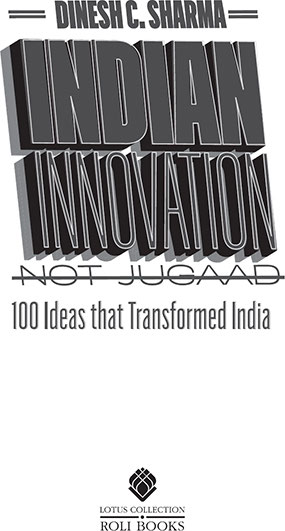
ROLI BOOKS
This digital edition published in India, 2022
The Lotus Collection
An Imprint of Roli Books Pvt. Ltd
M-75, Greater Kailash- II Market
New Delhi 110 048
Phone: ++91 (011) 40682000
Email: info@rolibooks.com
Website: www.rolibooks.com
Dinesh C. Sharma, 2022
All rights reserved.
No part of this publication may be reproduced, transmitted, or stored in a retrieval system, in any form or by any means, whether electronic, mechanical, print reproduction, recording or otherwise, without the prior permission of Roli Books. Any unauthorized distribution of this e-book may be considered a direct infringement of copyright and those responsible may be liable in law accordingly.
eISBN: 978-93-92130-08-3
All rights reserved.
This e-book is sold subject to the condition that it shall not, by way of trade or otherwise, be lent, resold, hired out, or otherwise circulated, without the publishers prior consent, in any form or cover other than that in which it is published.
Drawing up a mega list of innovations spanning decades and across sectors can be challenging, hazardous and vulnerable to criticism. Here is how I navigated through this.
To begin with, lets look at the advantages. I have lived through a large part of the period the book covers. In that sense, it is broadly a journey of exploring innovations that impacted the lives of people of my generation. Procuring grains from a ration shop was a routine activity for millions of Indians in the 1960s. Kids would often be sent to fair price shops to check if the stock of wheat had arrived. This was because the food supplies were erratic and dependent on imports. I also remember the images of lush green farms, signalling the Green Revolution, in the Films Division newsreels screened in cinema halls. Just as the grain supplies were easing, the Oil Shock hit us in the early 1970s, making kerosene scarcer. The response came in the form of a red-and-green wick stove named Nutan, which made its appearance in millions of Indian kitchens. Its blue flame became the talk of the town. The long waiting list for a landline phone connection, serpentine queues to book a railway ticket or trying to buy a car in black were all part of the folklore of the 1970s and 1980s. Innovations and creative policy changes helped us address them all. The economic liberalization and globalization in the 1990s and beyond ushered in several changes. This lived experience was at the back of my mind while drawing up a list of post-Independence innovations.
Font size:
Interval:
Bookmark:
Similar books «Indian Innovation, Not Jugaad - 100 Ideas that Transformed India»
Look at similar books to Indian Innovation, Not Jugaad - 100 Ideas that Transformed India. We have selected literature similar in name and meaning in the hope of providing readers with more options to find new, interesting, not yet read works.
Discussion, reviews of the book Indian Innovation, Not Jugaad - 100 Ideas that Transformed India and just readers' own opinions. Leave your comments, write what you think about the work, its meaning or the main characters. Specify what exactly you liked and what you didn't like, and why you think so.

